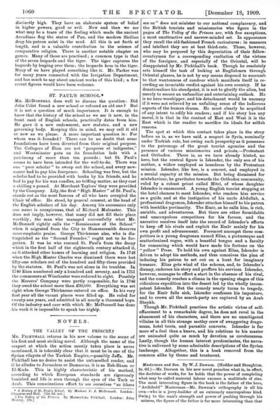ST. PAUL'S SCHOOL.*
Ain. litcDolorma, does well to discuss the question : Did John Colet found a new school or refound an old one ? But it is not a question of much importance. It is enough to know that the history of the school as we see it now, in the front rank of English schools, practically dates from him. He gave it a new endowment, new statutes, and a new governing body. Keeping this in mind, we may call it old or new as we please. A more important question is : For whom was it founded? There can be no doubt that some foundations have been diverted from their original purpose. The Collegera of Eton are not "pauperes et indigentes," and Westminster puts on its foundation lads with a patrimony of more than ten pounds ; but St. Paul's seems to have been intended for the well-to-do. There was .one "poor scholar" to sweep out the school, and every new- eomer had to pay him fourpence. Schooling was free, but the scholar had to be provided with books by his friends, and he had to pay for his wax candles, no trifling matter, as they cost a shilling a pound. At Merchant Taylors' they were provided by the Company. Lily, the first "High Master" of St. Paul's,
stands out as the most famous of all who have occupied the -Chair of office. He stood, by general consent, at the head of the English soholars of his day. Among his successors only one name is conspicuous, that of Richard Mulcaster. This does not imply, however, that many did not fill their place worthily ; the man who managed successfully what Mr. McDonnell rightly calls the "Renaissance of the School" -when it migrated from the City to Hammersmith deserves more emphatic praise. George Thicknesse also, who is dis- tinguished as the "Second Founder," ought not to be for- gotten. It was he who rescued St. Paul's from the decay which in the first half of the eighteenth century attacked it, .as it attacked other homes of learning and religion. In 1748 when the High Master Charles was dismissed there were but ~fifty-one scholars out of the hundred and fifty-three provided
• by the statutes. St. Paul's was not alone in its troubles. In -1740 Eton numbered only a hundred and seventy, and in 1751 the commoners at Winchester were reduced to eight. Possibly
the Mercers' Company were partly responsible, for in 1746 they owed the school more than £30,000. Everything was set right when George Thicknesse entered on office. In his very first year all the vacant places were filled up. He ruled for twenty-one years, and admitted in all nearly a thousand boys. Of the industry and care with which Mr. McDonnell has done ails work it is impossible to speak too highly.


















































 Previous page
Previous page